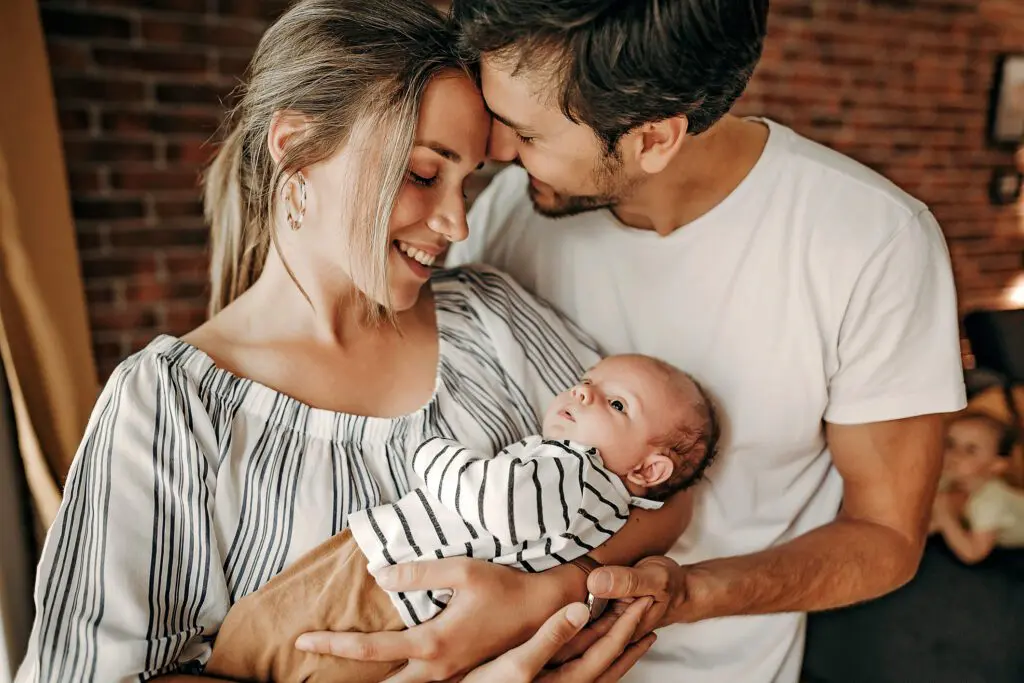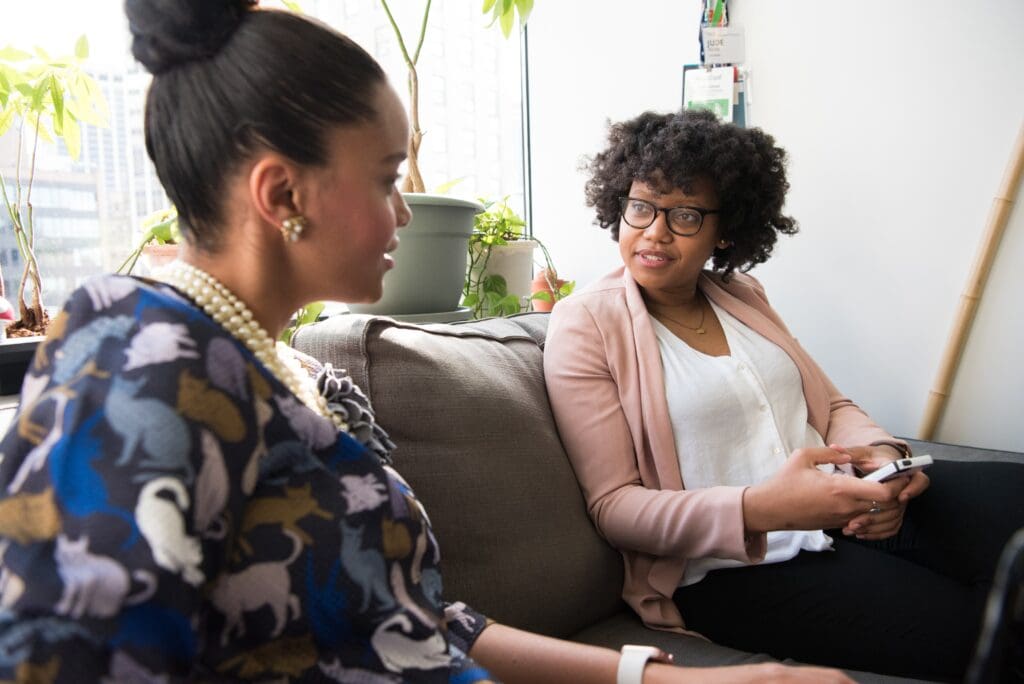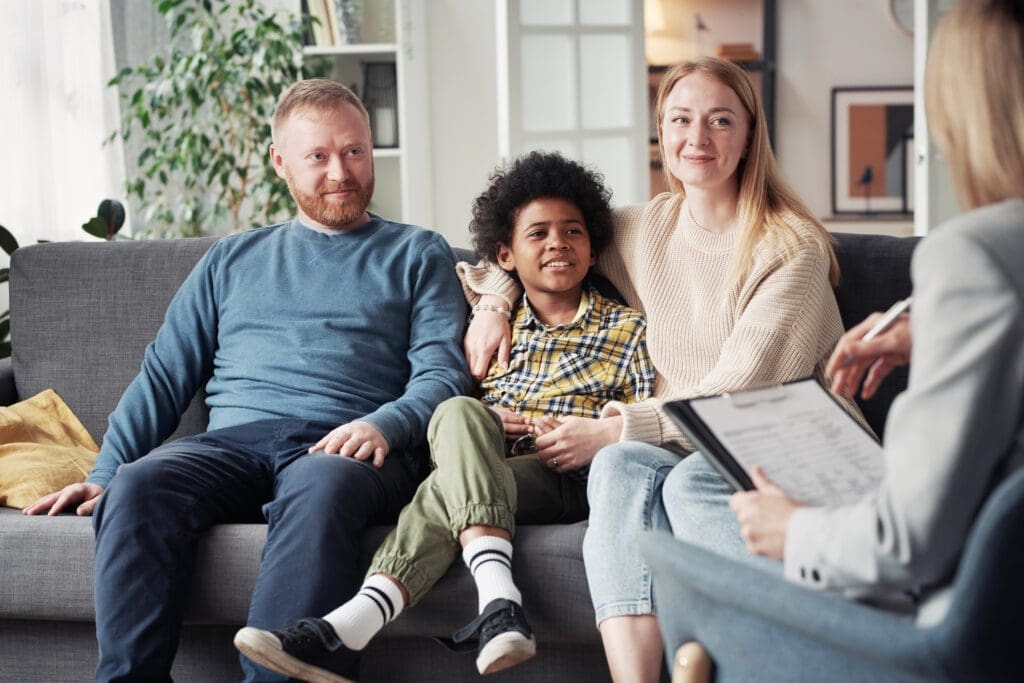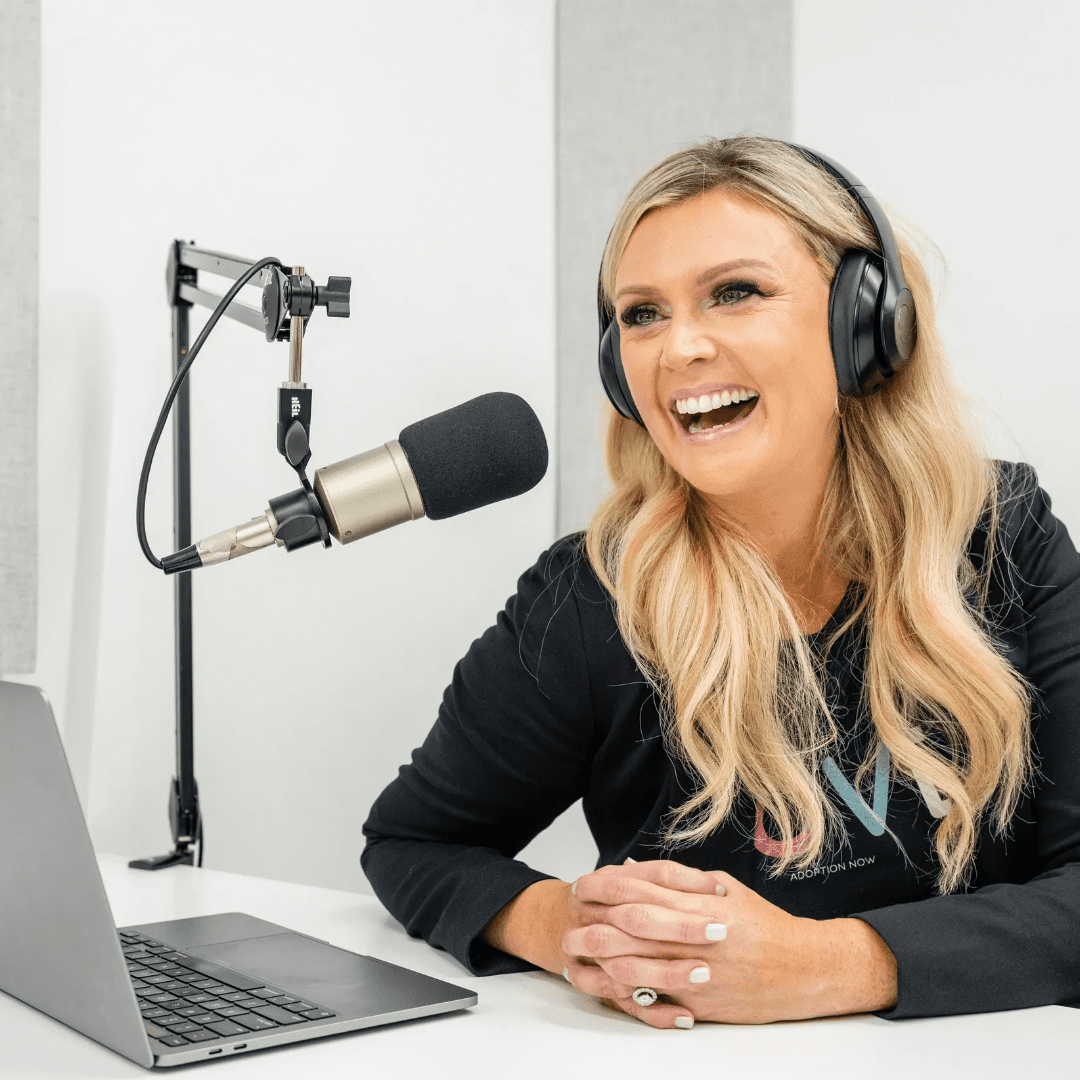
ADOPTION NOW Infant Adoption Guide
Thinking about growing your family through infant adoption? Take a deep breath – you’re in exactly the right place. Whether you’re just starting to explore the idea or ready to dive in, let’s walk through this journey together, step by step.
What is Infant Adoption?

When you choose infant adoption, you’re embarking on a journey to welcome a newborn into your family through domestic adoption. This means connecting with expectant mothers within the United States who are making an adoption plan for their baby. Most infant adoptions involve meeting and building a relationship with the birth family before the baby is born, and maintaining some level of connection as your child grows.
Today’s adoptions look different than they did years ago, with most families maintaining some level of openness. This shift has created healthier outcomes for everyone in the adoption triad – adoptive parents, birth parents, and especially the adopted child.
You can pursue infant adoption through:
- An adoption agency (full-service support and matching)
- An adoption attorney (legal guidance for private adoption)
- A combination of both (common in many states)
The journey typically takes 1-2 years from starting the process to holding your baby.
Starting Your Adoption Journey
Ready to start the infant adoption journey? Let’s map out those first steps together:
Take Time to Reflect and Learn
- Have those heart-to-heart talks with your partner and make sure you are both on board
- Look at your financial picture and explore resources available to you
- Dive into learning about different adoption paths (we’ll help you understand each one)
Find Your Adoption Partners
- Have conversations with agencies or attorneys
- Get clear on costs and timing (it’s okay to ask detailed questions!)
- Talk to other families who’ve worked with them
State Requirements: Agency States vs. Non-Agency States
Each state has its own process – some require you to partner with a licensed adoption agency, while others give you more flexibility to work directly with expectant parents through an attorney. It’s important to understand what your state allows, as this will shape your next steps.
Working with Adoption Agencies
Choosing your adoption agency is all about fit. Here’s what to look for:
- They have their credentials in order (yes, that official licensing matters!)
- They’re crystal clear about costs – no surprises down the road
- They offer the level of support you need
- They pick up the phone when you call (and actually call back!)
- Other families speak positively about their experience
- They show genuine care for both adoptive families and birth families
Don’t be shy about asking the important questions (that’s what they’re there for!):
- “How long do most families wait to be matched?”
- “What’s your track record for completed adoptions?”
- “What kind of support will we have along the way?”
- “How will you help us learn and prepare?”
- “What happens if we hit bumps in the road?”
- “What is your process for handling disrupted adoptions?”
The Real Costs of Infant Adoption

Let’s have an honest conversation about infant adoption costs.
Agency and Professional Fees
Domestic infant adoption typically costs between $30,000-$45,000. While it might feel overwhelming (trust me, we’ve all been there), remember: there are ways to make this work, and we’ll talk about those too.
What’s actually wrapped up in that number? Here’s what you’re really paying for:
- Getting your paperwork rolling (application fees)
- Home study visits
- Finding and connecting with expectant moms
- Making sure birth parents get the counseling they need
- Having someone check in after baby comes home
- All the behind-the-scenes coordination
Medical Considerations
Sometimes, birth mothers have solid insurance coverage that takes care of all the medical costs. Other times, they might need some extra support. Every state has its own guidelines about how adoptive families can help with medical expenses.
Travel Expenses
Travel expenses can be a significant part of your adoption budget, especially when you need to stay in another state while welcoming your child into your family. From airfare and hotels to rental cars and daily living expenses, these travel costs are an important part of your path to parenthood.
You’ll want budget for:
- Trips to meet birth parents
- Living out of a hotel during hospital time
- That two-week ICPC stay (think extended hotel + meals + rental car)
- Visits after baby comes home
- Getting official documents sorted
Creative Ways to Fund Your Adoption
Most families don’t write one big check for their adoption. Check out these amazing organizations that want to help you:
- HelpUsAdopt.org
- Gift of Adoption Fund
- National Adoption Foundation
- Show Hope
- A Child Waits Foundation
The Tax Credit
Let’s talk about the adoption tax credit. For 2025, it’s up to $17,280 per child.
Here’s details:
- You don’t need to use it all at once (it carries forward for 5 years)
- It covers most of all your qualified adoption expenses
- You’ll get it the year you finalize
- There are some income limits
*Please consult an accountant for more information.
Employer Benefits
Did you know your company might help fund your adoption? More and more employers are stepping up with adoption benefits including expense reimbursements, financial assistance, paid time off to bond with your baby, and protection for unpaid leave.
Understanding the Legal Journey
Every adoption has important legal steps that help protect everyone involved – birth parents, adoptive parents, and especially your future child. Let’s break down what you need to know.
Working with Adoption Attorneys
There’s some important legal territory to navigate – that’s where adoption attorneys come in. If you’re working with an agency, they’ll likely connect you with an experienced adoption attorney when it’s time to make everything official. (And yes, you’ll need one even with an agency).
What to look for in your adoption attorney:
- Experience specifically in adoption law
- Knowledge of both your state and interstate adoption requirements
- Clear communication style
- Transparent fee structure
- Strong reputation in the adoption community
Understanding Birth Parent Rights
Every state has its own rules about:
- When birth parents can sign consent papers
- Revocation periods (how long they have to change their minds)
- Birth father rights and requirements
- Allowable adoption expenses
- Future contact agreements
- Privacy protections
The Path to Finalization
Your legal journey includes several key steps:
Before Placement:
- Birth parent consent documentation
- ICPC approval (for interstate adoptions)
- Background clearances
- Home study approval
After Placement:
- Post-placement visit documentation
- Final consent verifications
- Court filing preparation
- Finalization hearing arrangements
The Finalization Hearing:
- Usually happens 6-8 months after placement
- Typically a joyful, brief court appearance
- Results in your final adoption decree
- Leads to new birth certificate and social security card
Remember: Your attorney will guide you through each step. You don’t have to memorize all the legal details. That’s what they’re there for!
Adopting Across State Lines
Planning to adopt from another state? There’s something called the Interstate Compact on the Placement of Children (ICPC). Think of it as your family’s safety net when adopting across state lines. It:
- Wraps your child in protection every step of the way
- Keeps everyone connected and communicating
- Ensures your adoption follows all the right steps in both states
Here’s a heads up: you’ll need both states to give their thumbs up before heading home with your baby. Usually, this adds about 7-14 days to your stay in that state.
The Home Study Process for Infant Adoption

The home study is not as scary or intimidating as it sounds. Your social worker isn’t looking for a perfect Instagram-worthy home. They want to see that you’re ready to be a parent – mentally, emotionally, and practically. They’re actually on your team, helping you prepare for this amazing journey!
Your Documentation Guide
Let’s break down exactly what you’ll need and why:
Personal Documentation
- Birth certificates (for all applicants)
- Marriage license or divorce decrees
- Driver’s licenses or state IDs
- 3-5 reference letters from family and friends
Financial Documentation
- Recent tax returns (typically last 2-3 years)
- Bank statements and pay stubs
- Employment verification
- Information about assets and debts
Medical Records
- Recent physical exam results
- Vaccination records
- Medical history
- Any relevant specialist reports
- Vaccination reports for your pets too!
The Background Check Process
Background checks are one of the ways we make sure every child’s story starts with safety and love. For every adult who’ll share your home, here’s what this part of the journey looks like:
- Getting fingerprints done
- Checking in with state records
- Making sure there’s no history of child safety concerns
- Double-checking all those important registries
- Getting the local police department’s stamp of approval
- Having your workplace confirm your employment
- Hearing from those wonderful people who’ve offered to be your references
Adoption Education and Preparation
Your home study provider will most likely require adoption education. Some providers even include ADOPTION NOW podcasts as an option! You’ll learn about:
- Building attachment with your child
- Navigating transracial adoption (if that’s your path)
- Creating meaningful connections with the child’s birth family
And your home? Don’t panic! You don’t need a nursery that belongs in a magazine. Focus on the basics:
- Make sure your smoke detectors work
- Create a cozy sleep space
- Baby-proof the obvious dangers
- Set up a basic sleeping area (even if the full nursery comes later)
What to Expect During Home Study Visits
Your social worker will typically schedule 2-3 visits to:
- Get to know you and your family
- See your living space
- Talk about your parenting plans
- Discuss your support system
- Answer any questions you have
- Help prepare you for the journey ahead
Creating Your Profile
This is where you get to tell your story. Think of your profile as your family’s highlight reel, but keep it real.
For photos, include holiday traditions, candids, you doing what you love, your pets, and your house.
When writing your story, share why you’re choosing adoption, how you’ll parent, family traditions, and what you do on the weekends.
Remember, birth parents aren’t looking for perfect – they’re looking for real. They want to see the authentic you.
Building Relationships with Birth Parents (The Heart of Your Adoption Story)
First Connections
Meeting potential birth parents can feel like a first date multiplied by a million! Deep breath – they’re probably just as nervous as you are!
These relationships are built on trust, respect, and lots of heart-to-heart moments. While every connection is unique (just like every family!), here’s some tips to help:
- Keep in touch like you promised
- Respect boundaries
- Follow through on your word
- Share updates
- Answer messages promptly (even just to say “got your message, will respond soon!”)
- Show lots of gratitude (it means the world to them)
The Matching Journey
Sometimes you’ll meet a birth mom and have an instant connection. Other times, it takes a few conversations to find your groove. Both are totally normal! Here’s what might happen along the way:
- Starting with emails or calls
- Moving to video chats or coffee dates
- Answering questions about your life
- Talking about what open adoption means to you
- Planning for the hospital
- Figuring out how you’ll stay in touch after baby comes home
When a Match Changes Course
Sometimes adoption plans change, and that’s okay. Here’s what you need to know:
- These situations are normal parts of the adoption journey
- It’s okay to feel disappointed or sad
- Your adoption professionals are there to support you
- Many families go on to successful adoptions
- Take time to process before moving forward
- Lean on your support system
- Consider talking with a counselor who understands adoption
Remember: Being prepared for different possibilities doesn’t mean you’ll face them all. It just means you’ll be ready to embrace whatever path leads you to your child.
Infant Adoption Finalization
Remember all those legal steps we talked about earlier? This is where it all comes together! Your finalization hearing is typically a joyful, brief court appearance.
Your attorney will help ensure you have everything ready:
- Birth parent consent forms
- Your approved home study
- ICPC paperwork (if it’s interstate)
- Post-placement visit reports
- Medical records
- Financial documentation
Feeling nervous? Don’t be! Most finalization hearings are warm, celebratory moments. Some courts even encourage photos, and many families bring their loved ones to witness this special milestone.
Getting Ready for Baby! The Wait Is Almost Over!
Your Heart During the Journey
Between matching and placement, your emotions are going to be ALL over the place. And guess what? That’s completely normal! You might:
- Feel like you’re walking on clouds one minute
- Worry about every little thing
- Have those 3 AM “what if” moments
- Dream about holding your baby
- Think about the birth parents and send them good vibes
Here’s your permission slip: ALL those feelings are valid! Every single one.
Your Support Squad (Because You Shouldn’t Do This Alone!)
Remember how it takes a village? Time to build yours! Here’s who you want in your corner:
- Other adoptive parents who “get it”
- A mentor who’s been there, done that
- Fellow waiting parents (they understand the wait like no one else!)
- Those friends who’ll let you talk about adoption ALL day
The Fun Part – Getting Ready! (Channel That Nervous Energy!)
Start with the must-haves:
- A safe place for baby to sleep
- Diapers and wipes
- Onesies and sleepers in a few sizes (they grow FAST!)
- Bottles and formula
- A car seat (pro tip: wait and purchase this once birth mom places)
- Basic first-aid kit (thermometer, nail clippers, etc.)
Health Items
You’ll want to:
- Find a pediatrician who understands adoption
- Sort out insurance coverage
- Gather any available medical history
- Stock up on basic meds
- Get a first check-up on the books
- Take an infant CPR class
After Baby Comes Home
Your social worker will pop by to see how everyone’s doing. These visits are actually pretty great – they’re your chance to ask all those “is this normal?” questions! They’ll:
- Check in pretty quick after homecoming
- Keep visiting monthly for a bit (each state requires a different number of visits)
- Help with any bumps in the road
- Connect you with resources
- Get everything ready for finalization
Once you’re home, your attorney will guide you through the final steps of the legal process (which we covered in the Understanding the Legal Journey section). This includes finalizing your adoption and getting your child’s new birth certificate and social security card.
Building Your Adoption Support Team
Every successful adoption journey includes a strong support system. Here’s how to build yours:
Professional Support
Connect with experienced adoption professionals who can guide your journey:
- Adoption agencies (to help match you with expectant parents)
- Adoption attorneys (to navigate the legal process)
- Financial advisors (to help plan your adoption funding)
- Adoption coaches (like us at ADOPTION NOW!)
- Mental health professionals who understand adoption
Community Connections
Find your adoption community:
- Local adoption support groups
- Online adoption communities
- Adoptive family mentors
- Birth parent support organizations
- Cultural community groups (especially for transracial adoption)
Resources for Your Journey
Take advantage of these valuable resources:
- Adoption education programs
- Financial grant organizations
- Books and podcasts about adoption
- Online adoption courses
- ADOPTION NOW coaching services
Ready to Take Your Next Step?
Whether you’re just starting to explore adoption or ready to move forward, we’re here to help. ADOPTION NOW offers:
- Pre-adoption coaching
- Adoption process guidance
- Post-placement support
- Educational resources
- Community connections

ADOPTION NOW COACHING
ADOPTION NOW provides expert coaching that helps you navigate every stage of the adoption journey with confidence. Schedule a free call to learn more!
Frequently Asked Questions
How Does Open Adoption Impact Children?
Research shows that when safe and appropriate, children in open adoptions often develop a stronger sense of self and feel more grounded in their story.
Is Adoption Final?
While states do have specific timeframes when birth parents can reconsider (it varies depending on where you live), once those periods pass and all consents are signed, your family is as legally secure as any other.
How Long Will We Wait?
Most families welcome their child within 1-2 years. Yes, the waiting can feel like time is moving in slow motion (we completely understand!), but there is a beautiful light at the end of this tunnel.



